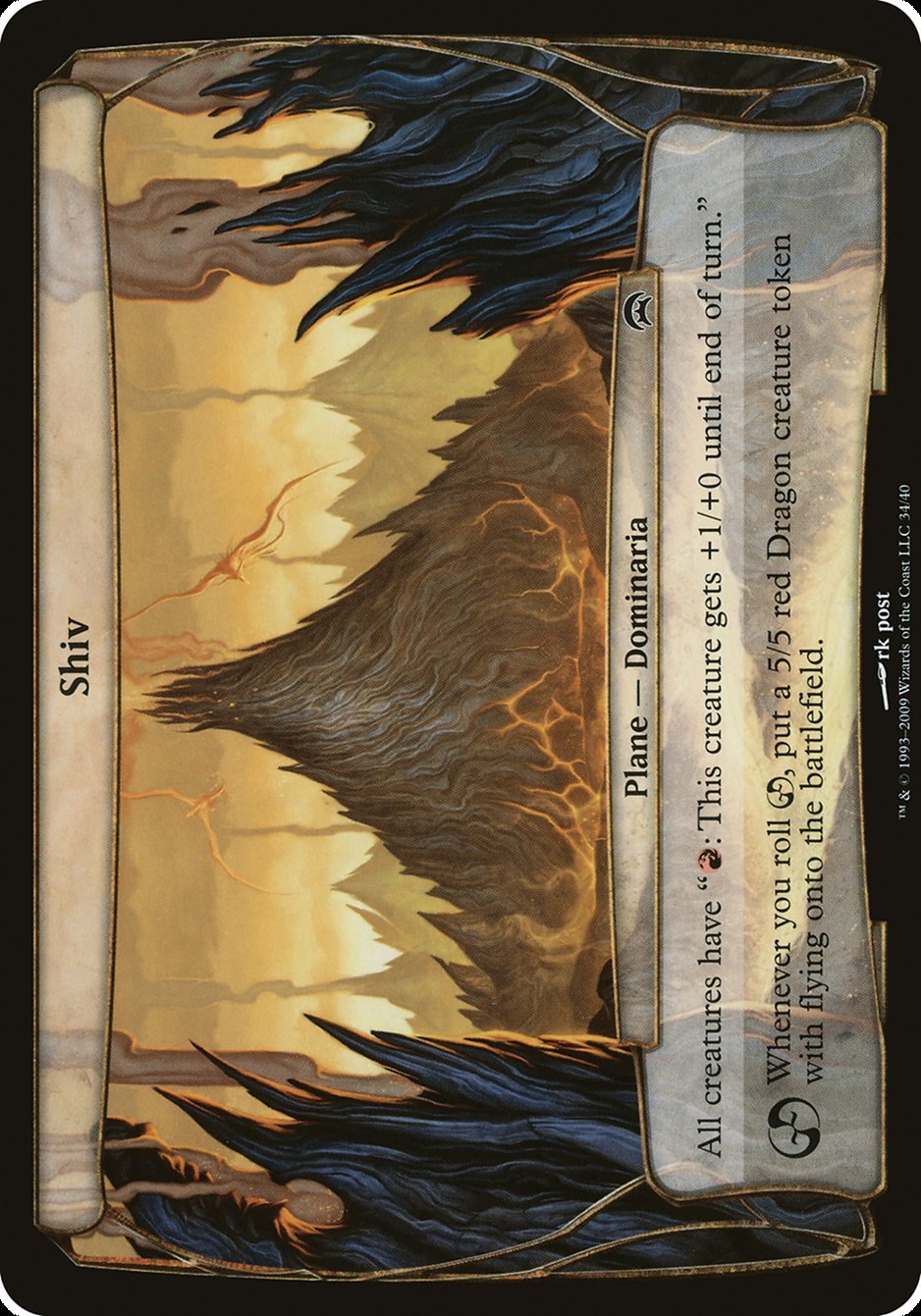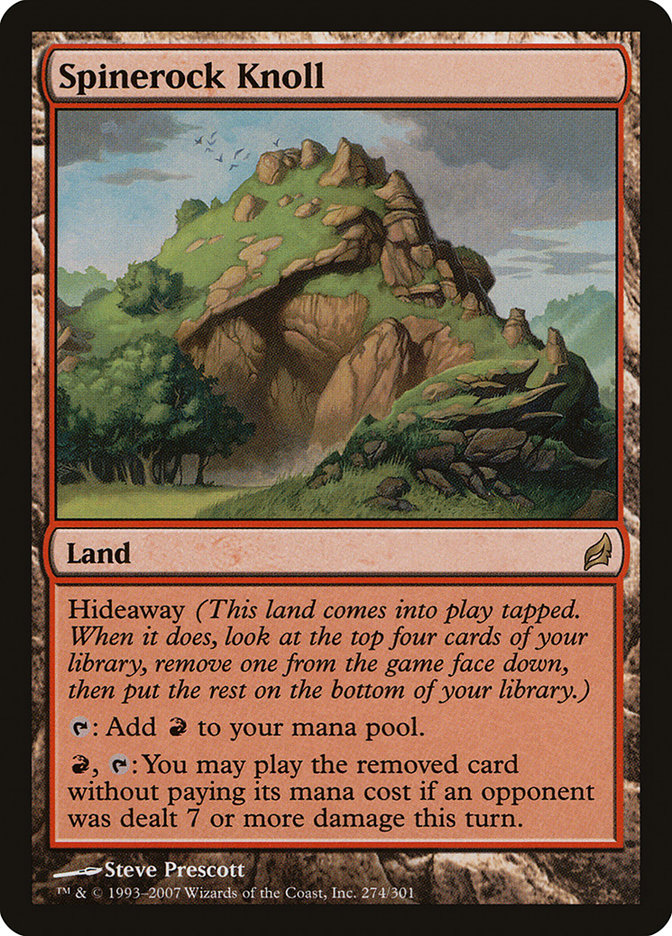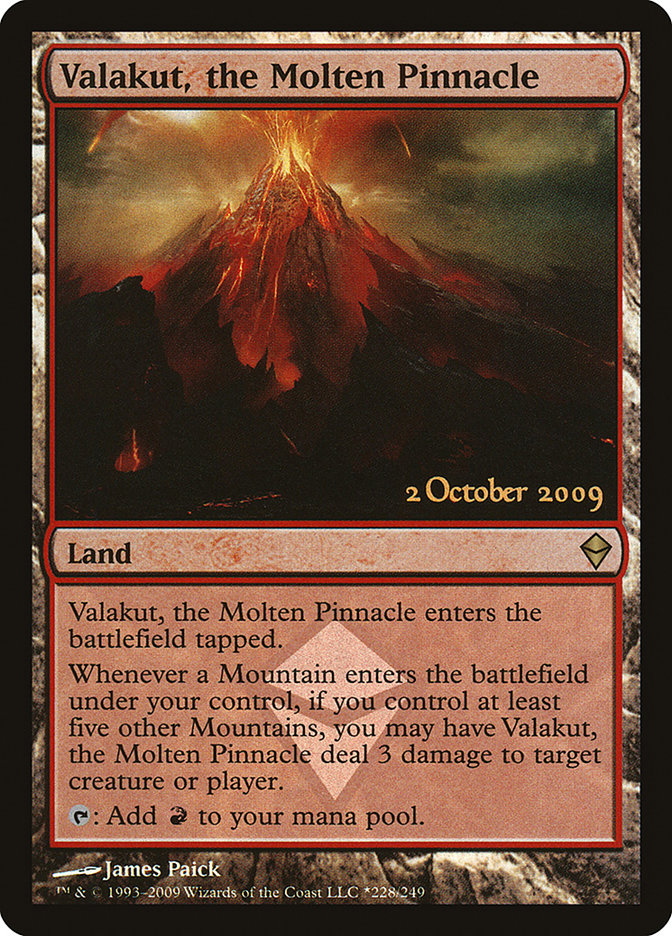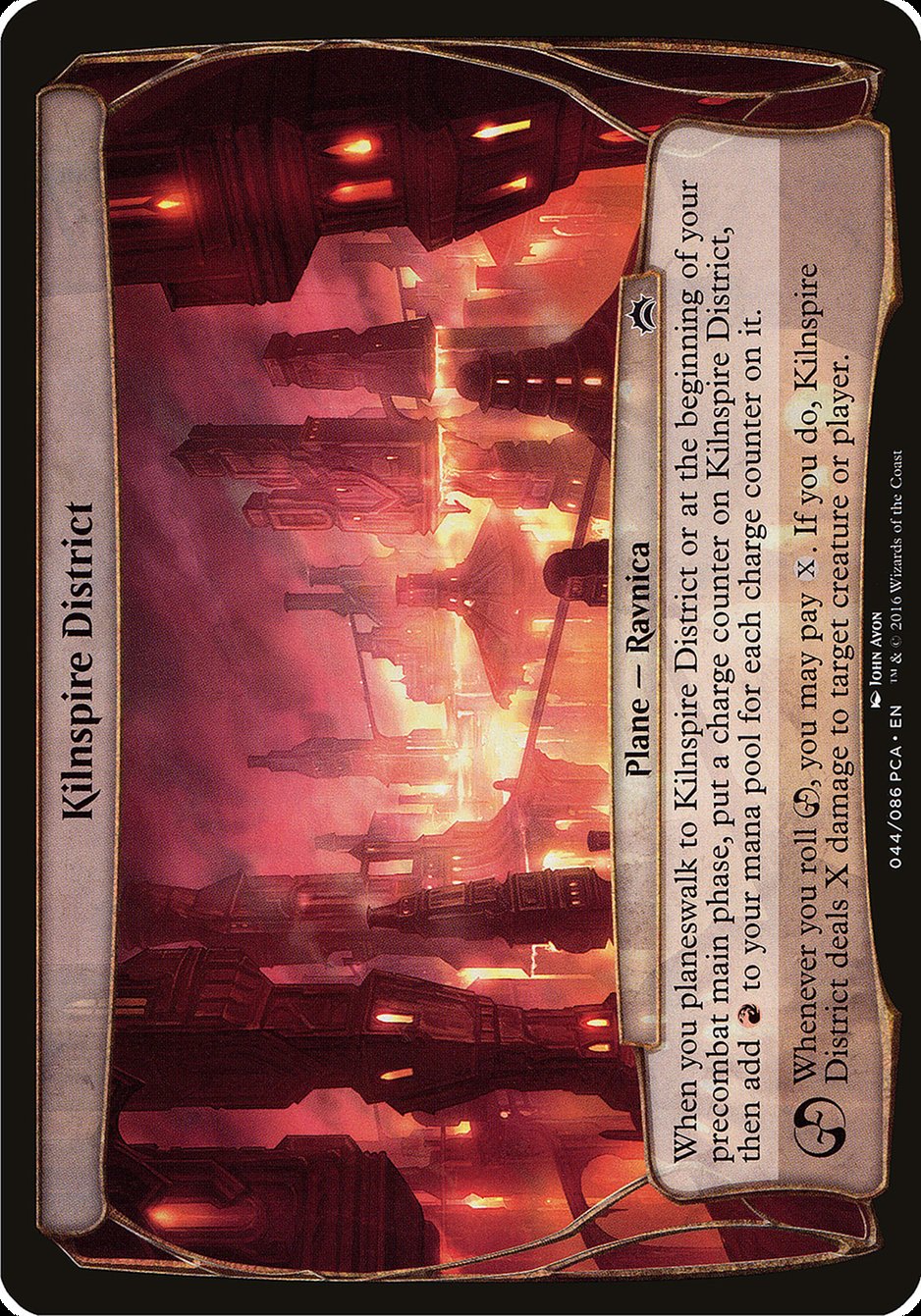Shiv MTG Card
| Card sets | Released in 2 setsSee all |
| Rarity | Common |
| Type | Plane — Dominaria |
Text of card
All creatures have ": This creature gets +1/+0 until end of turn." Whenever you roll chaos, put a 5/5 red Dragon creature token with flying onto the battlefield.
Cards like Shiv
Shiv is notable for its distinct contribution to land strategy within MTG. It’s often compared to other nonbasic lands like Spinerock Knoll due to its ability to provide an alternative source of red mana. However, Shiv sets itself apart with its capability of providing mana without entering the battlefield tapped, a characteristic not found in Spinerock Knoll. This ensures immediate impact and flexibility in mana usage.
Another land with a similar mana-generating role is Valakut, the Molten Pinnacle. Like Shiv, it enriches your mana pool with red mana. Yet, Valakut also comes with a potent ability to deal damage under certain conditions, offering not just mana but a potential game-ending mechanism. Despite this, Valakut requires a setup of having enough mountains which can make it conditionally slower than the straightforward usage you obtain from Shiv.
Assessing Shiv’s potential, especially when you require consistent red mana without the drawback of coming into play tapped, it indeed seems to be a solid choice. While it doesn’t come with the additional effects of Spinerock Knoll or Valakut, its reliability and speed can be invaluable in a game where tempo is crucial.
Cards similar to Shiv by color, type and mana cost
Card Pros
Card Advantage: When it comes to card efficiency, Shiv shines by enabling you to potentially access more cards than your opponent. This could tip the scales in your favor by providing you with a greater selection of options to play with each turn.
Resource Acceleration: This card can dramatically speed up your gameplay, giving you the fast track to higher-cost spells. By boosting your mana resources, you can outpace opponents, deploying threats or responses sooner than they might expect.
Instant Speed: The adaptability offered by instant speed spells is invaluable. Being able to wait until the ideal moment to play Shiv, perhaps even during your opponent’s turn, ensures that you’re maximizing your tactical opportunities and keeping your adversaries on their toes.
Card Cons
Discard Requirement: The Shiv spell in MTG demands that you discard another card upon casting. This prerequisite can strain your hand, particularly when you’re struggling to maintain a healthy number of cards to react to your opponent’s moves or to follow through with your strategy.
Specific Mana Cost: The activation of the Shiv’s effect is tied to a specific mana investment – typically requiring a substantial amount of red mana. This can be a hurdle in multicolored decks where mana bases are stretched across various color requirements and the red mana needed for Shiv could be competing with other crucial spells in the deck.
Comparatively High Mana Cost: The mana cost to bring Shiv into play may be viewed as steep relative to the abilities it provides. As MTG evolves and new cards are released, the standard for cost-efficiency shifts, often rendering older cards like Shiv less optimal when compared to newer options that could execute similar effects for less mana or with additional benefits.
Reasons to Include Shiv in Your Collection
Versatility: Shiv is a powerful land card that adds a splash of red mana to your deck without entering the battlefield tapped, enabling immediate impact. This flexibility is key for decks looking to execute their strategies without delay.
Combo Potential: With the ability to generate red mana, Shiv can be a crucial element in combos that require red spells or abilities. It’s a linchpin in strategies seeking to unleash a series of plays in a single turn, leveraging this resource efficiently.
Meta-Relevance: In a game where the right mana at the right time is pivotal, Shiv holds its value especially in formats where strong red spells and multi-colored deck strategies are predominant. It ensures that your red-centric strategies remain competitive regardless of the changing meta.
How to beat
In the strategic world of Magic: The Gathering, confronting the Shiv card requires a keen understanding of its weaknesses. This red land is known for its ability to turn into a 3/3 red Dragon creature with flying until end of turn. However, it remains vulnerable to removal spells when activated. Efficient answers include instant-speed removal spells, which can be cast after the land has been turned into a creature but before the attack phase commences. Crucially, this relies on timing and the right mana management.
Moreover, players should consider utilizing land destruction cards to target Shiv preemptively, eliminating the potential threat before it can activate its transformative ability. Ensnaring the opponent’s mana base with such strategies often undermines their broader game plan, making land destruction a key tactic in your arsenal. Another angle is to employ cards that limit abilities, effectively preventing the activation of Shiv’s formidable Dragon transformation. This proactive approach often forces opponents into less favorable plays, maintaining the upper hand throughout the match.
To sum it up, ensure that your deck contains a mix of instant-speed removal, land destruction, and ability-limiting cards to counter the versatile threat posed by the Shiv card. Knowing when to play these specific counters will cement your strategic advantage over the fiery terrain of MTG.
Where to buy
If you're looking to purchase Shiv MTG card by a specific set like Planechase Planes and Planechase Anthology Planes, there are several reliable options to consider. One of the primary sources is your local game store, where you can often find booster packs, individual cards, and preconstructed decks from current and some past sets. They often offer the added benefit of a community where you can trade with other players.
For a broader inventory, particularly of older sets, online marketplaces like TCGPlayer, Card Kingdom and Card Market offer extensive selections and allow you to search for cards from specific sets. Larger e-commerce platforms like eBay and Amazon also have listings from various sellers, which can be a good place to look for sealed product and rare finds.
Additionally, Magic’s official site often has a store locator and retailer lists for finding Wizards of the Coast licensed products. Remember to check for authenticity and the condition of the cards when purchasing, especially from individual sellers on larger marketplaces.
Below is a list of some store websites where you can buy the Shiv and other MTG cards:
 BUY NOW
BUY NOW BurnMana is an official partner of TCGPlayer
- eBay
- Card Kingdom
- Card Market
- Star City Games
- CoolStuffInc
- MTG Mint Card
- Hareruya
- Troll and Toad
- ABU Games
- Card Hoarder Magic Online
- MTGO Traders Magic Online
See MTG Products
Printings
The Shiv Magic the Gathering card was released in 2 different sets between 2009-09-04 and 2018-12-25. Illustrated by rk post.
| # | Released | Name | Code | Symbol | Number | Frame | Layout | Border | Artist |
|---|---|---|---|---|---|---|---|---|---|
| 1 | 2009-09-04 | Planechase Planes | OHOP | 34 | 2003 | Planar | Black | rk post | |
| 2 | 2018-12-25 | Planechase Anthology Planes | OPCA | 70 | 2015 | Planar | Black | rk post |
Rules and information
The reference guide for Magic: The Gathering Shiv card rulings provides official rulings, any errata issued, as well as a record of all the functional modifications that have occurred.
| Date | Text |
|---|---|
| 2009-10-01 | A face-up plane card that’s turned face down becomes a new object with no relation to its previous existence. In particular, it loses all counters it may have had. |
| 2009-10-01 | A plane card is treated as if its text box included “When you roll {PW}, put this card on the bottom of its owner’s planar deck face down, then move the top card of your planar deck off that planar deck and turn it face up.” This is called the “planeswalking ability.” |
| 2009-10-01 | If an ability of a plane refers to “you,” it’s referring to whoever the plane’s controller is at the time, not to the player that started the game with that plane card in their deck. Many abilities of plane cards affect all players, while many others affect only the planar controller, so read each ability carefully. |
| 2009-10-01 | The controller of a face-up plane card is the player designated as the “planar controller.” Normally, the planar controller is whoever the active player is. However, if the current planar controller would leave the game, instead the next player in turn order that wouldn’t leave the game becomes the planar controller, then the old planar controller leaves the game. The new planar controller retains that designation until they leave the game or a different player becomes the active player, whichever comes first. |




